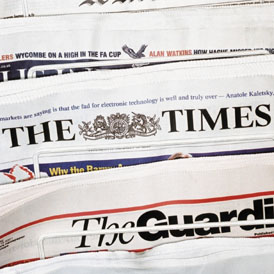PCC fights for survival after ‘toothless poodle’ jibe
The Press Complaints Commission has insisted it still has a role to play after both David Cameron and Ed Miliband called for the watchdog to be scrapped.

The Press Complaints Commission is fighting for its life after the Prime Minister called for “a new system entirely” for regulating the media.
David Cameron announced that he would be having talks with Deputy Prime Minister Nick Clegg and Labour leader Ed Miliband, who has also called for the watchdog to be scrapped, on the creation of a new regulatory body independent from both the press and politicians.
Mr Cameron announced the move as his former communications chief Andy Coulson was arrested on suspicion of phone hacking and corruption following widespread allegations of wrongdoing at the News of the World while he was the editor.
The Prime Minister said: “Let’s be honest. The Press Complaints Commission has failed. In this case, the hacking case, frankly it was pretty much absent. Therefore we have to conclude that it’s ineffective and lacking in rigour.
“There is a strong case for saying it’s institutionally conflicted because competing newspapers judge each other. As a result it lacks public confidence.
“I believe we need a new system entirely. It will be for the inquiry to recommend what the system should look like.
Let’s be honest. The Press Complaints Commission has failed. David Cameron
“But my starting presumption is that it should be truly independent, independent from the press, so the public will know that newspapers will never again be solely responsible for policing themselves.
“But vitally, independent of government, so the public will know that politicians are not trying to control or muzzle a press that must be free to hold politicians to account.”
The move is set to create the first independent regulatory body to oversee the activities of British newspapers.
The PCC currently operates under the principle of self-regulation. Eight of its 17 members are senior media executives, including the editors of the Sunday Mirror, the Mail on Sunday, the Scotsman and the Sunday Telegraph.
The commission negotiates apologies and corrections on behalf of complainants but has no power to punish journalists or editors other than making public criticism or writing a letter of admonishment.
By comparison, the broadcasting regulator Ofcom can impose heavy fines or revoke licences if material is broadcast on television or radio that treats people unfairly or invades their privacy.
Print journalists can be prosecuted for libel, contempt of court or other breaches of the law like naming the victim of a sex crime.
Mr Miliband said the PCC had been exposed as a “toothless poodle” for failing in a 2009 report to fully investigate the hacking scandal and for concluding that there was no evidence it had been misled by the News of the World.
We do not accept that the scandal of phone hacking should claim, as a convenient scalp, the Press Complaints Commission. PCC statement
Bob Satchwell, Chief Executive of the Society of Editors, said the PCC had assumed the original police inquiry had been thorough after it led to the convictions of private investigator Glenn Mulcaire and Clive Goodman.
Goodman, the tabloid’s royal editor, has now been rearrested in connection with alleged payments to police.
Mr Satchwell said: “We must bear in mind, as Mr Cameron said, that everyone thought that (the scandal) had been dealt with by the original police inquiry.
“He believed that and I think other people were entitled to believe that. What’s absolutely clear now is that the police didn’t look at all the evidence. If they had, the PCC might have come to a different view and taken a tougher stance against the News of the World.”
He added: “The idea that this is a total failure of ethics across the press and of the PCC is absolute nonsense. This story is not actually about media ethics, it’s about crime. Phone hacking is against the law.”
The commission has indicated it will fight to save itself from the axe.
The PCC said in a statement: “We do not accept that the scandal of phone hacking should claim, as a convenient scalp, the Press Complaints Commission. The work of the PCC, and of a press allowed to have freedom of expression, has been grossly undervalued today.”